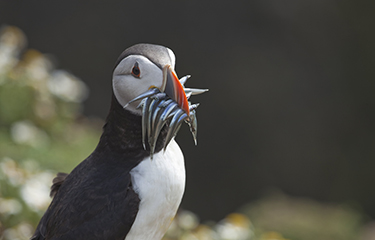The U.K. Department of Environment, Food, and Rural Affairs (DEFRA) has officially cancelled fishing for sandeel in 2023, the third straight year fishing has been banned.
The latest ban, according to a release, is intended to benefit the wider marine ecosystem, particularly sea birds and marine mammals, that feed on the fish. The ban means U.K. fishermen will not be allowed to catch or swap any of the agreed-upon quota for sandeel fishing in the North Sea, which totals 5,773 metric tons (MT).
“By not allowing the U.K. commercial fishing of sandeels, we can better protect and enhance the lives of vulnerable seabirds and marine mammals that play such a crucial part in our marine ecosystems,” U.K. Fisheries Minister Mark Spencer said in a release. “Sandeels are an important component in the food chain for some of our most treasured species, such as puffins, and the decision to not allow sandeel fishing for a third year running will help benefit our seabird populations and allow wildlife to thrive.”
Multiple European Union countries fish for sandeel, a small oily fish use in the European fishmeal industry. Fishing is mainly dominated by Denmark and Norway, and the Norwegian sandeel, pout, and North Sea sprat fishery is Marine Stewardship Council certified.
This year, the International Council for the Exploration of the Seas (ICES) said that if a maximum sustainable year approach is applied, catch for sandeel should be no more than 120,428 MT in the greater North Sea region. Norway’s sandeel quota for the 2023 fishery is 60,000 MT. The population has dropped considerably in the last few years, with researchers at the Norwegian Institute of Marine Research indicating poor recruitment in recent years. In 2020, the fishery caught over 240,000 MT of the species.
The ban by the U.K. comes soon after Scotland announced that it has launched a consultation to end all commercial sandeel fishing in Scottish waters, also in order to protect seabirds. Research suggests that the level of the sandeel fishery and declines in seabird populations are linked, The Scotsman reported, and species that are more dependent on sandeels for food are more vulnerable.
Environmentalists are pushing Scotland to follow through on the ban.
“Closing Scottish waters to industrial sandeel fishing is the single greatest action that can be taken to support our most vulnerable seabirds right now,” Royal Society for the Protection of Birds Head of Policy Aedán Smith said in a release. “It will not only build their resilience in the face of Avian Flu but also help them weather the multitude of other human made pressures they face.”
Photo courtesy of Tricobliss/Shutterstock







